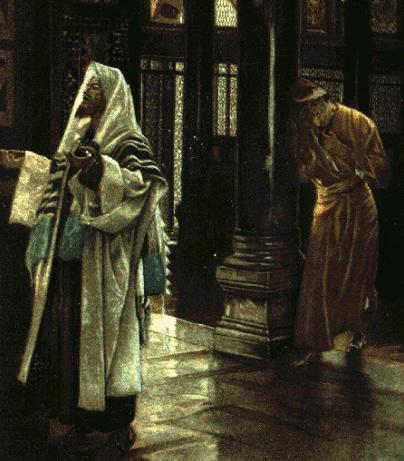The Eleventh Sunday after
Trinity
O GOD, who declarest thy almighty power chiefly in showing mercy and pity; Mercifully grant unto us such a measure of thy grace, that we may obtain thy gracious promises, and be made partakers of thy heavenly treasure; through Jesus Christ our Lord. Amen.
Source: Gelasius [492-496]. This is the orignial as Cranmer translated it faithfully, It it was altered in the 1662 update by adding the phrase " running the way of thy commandments" The Collect's emphasis on Grace, compliments the story of the Pharisee and the Publican praying in today's Gospel story from Luke.
Isaiah xxvi. 12, Psalm 125, 1 Corinthians xv. 1
St. Luke xviii. 9
Homily

cc-art.com
Standing afar off, smote upon his breast
Isaiah xxvi. 12 LORD, thou wilt ordain peace for us: for thou also hast wrought all our works in us. O LORD our God, other lords beside thee have had dominion over us: but by thee only will we make mention of thy name. They are dead, they shall not live; they are deceased, they shall not rise: therefore hast thou visited and destroyed them, and made all their memory to perish. Thou hast increased the nation, O LORD, thou hast increased the nation: thou art glorified: thou hadst removed it far unto all the ends of the earth. LORD, in trouble have they visited thee, they poured out a prayer when thy chastening was upon them. Like as a woman with child, that draweth near the time of her delivery, is in pain, and crieth out in her pangs; so have we been in thy sight, O LORD. We have been with child, we have been in pain, we have as it were brought forth wind; we have not wrought any deliverance in the earth; neither have the inhabitants of the world fallen. Thy dead men shall live, together with my dead body shall they arise. Awake and sing, ye that dwell in dust: for thy dew is as the dew of herbs, and the earth shall cast out the dead.
1 Corinthians xv. 1
BRETHREN, I declare unto you the gospel which I preached unto you, which also ye have received, and wherein ye stand; by which also ye are saved, if ye keep in memory what I preached unto you, unless ye have believed in vain. For I delivered unto you first of all that which I also received, how that Christ died for our sins according to the scriptures; and that he was buried, and that he rose again the third day according to the scriptures: and that he was seen of Cephas, then of the twelve: after that, he was seen of above five hundred brethren at once; of whom the greater part remain unto this present, but some are fallen asleep. After that, he was seen of James; then of all the apostles. And last of all he was seen of me also, as of one born out of due time. For I am the least of the apostles, that am not meet to be called an apostle, because I persecuted the church of God. But by the grace of God I am what I am: and his grace which was bestowed upon me was not in vain; but I laboured more abundantly than they all: yet not I, but the grace of God which was with me. Therefore whether it were I or they, so we preach, and so ye believed.St. Luke xviii. 9
JESUS spake this parable unto certain which trusted in themselves that they were righteous, and despised others: Two men went up into the temple to pray; the one a Pharisee, and the other a publican. The Pharisee stood and prayed thus with himself, God, I thank thee, that I am not as other men are, extortioners, unjust, adulterers, or even as this publican. I fast twice in the week, I give tithes of all that I possess. And the publican, standing afar off, would not lift up so much as his eyes unto heaven, but smote upon his breast, saying, God be merciful to me a sinner. I tell you, this man went down to his house justified rather than the other: for every one that exalteth himself shall be abased; and he that humbleth himself shall be exalted.Scripture from 1928 Book of Common Prayer, KJV, Collect information from The Collects of Thomas Cranmer

How the humble and the haughty are to be admonished.
Gregory, Bishop of Rome [ca 520 AD]

Differently to be admonished are the humble and the haughty. To the former it is to be insinuated how true is that excellence which they hold in hoping for it; to the latter it is to be intimated how that temporal glory is as nothing which even when embracing it they hold not. Let the humble hear how eternal are the things that they long for, how transitory the things which they despise; let the haughty hear how transitory are the things they court, how eternal the things they lose. Let the humble hear from the authoritative voice of the Truth, Every one that humbleth himself shall be exalted (Luke xviii. 14). Let the haughty hear, Every one that exalteth himself shall be humbled (Ibid.). Let the humble hear, Humility goeth before glory; let the haughty hear, The spirit is exalted before a fall (Prov. xv. 33; xvi. 18). Let the humble hear, Unto whom shall I have respect, but to him that is humble and quiet, and that trembleth at my words (Isai. lxvi. 2)? Let the haughty hear, Why is earth and ashes proud (Ecclus. x. 9)? Let the humble hear, God hath respect unto the things that are humble. Let the haughty hear, And lofty things He knoweth afar off (Psal. cxxxvii. 6). Let the humble hear, That the Son of Man came not to be ministered unto, but to minister (Matth. xx. 28); let the haughty hear, that The beginning of all sin is pride (Ecclus. x. 13). Let the humble hear, that Our Redeemer humbled himself, being made obedient even unto death (Philip. ii. 8); let the haughty hear what is written concerning their head, He is king over all the sons of pride (Job xli. 25). The pride, therefore, of the devil became the occasion of our perdition, and the humility of God has been found the argument for our redemption. For our enemy, having been created among all things, desired to appear exalted above all things; but our Redeemer, remaining great above all things, deigned to become little among all things.
Let the humble, then, be told that, when they abase themselves, they ascend to the likeness of God; let the haughty be told that, when they exalt themselves, they fall into imitation of the apostate angel. What, then, is more debased than haughtiness, which, while it stretches itself above itself, is lengthened out beyond the stature of true loftiness? And what is more sublime than humility, which, while it depresses itself to the lowest, conjoins itself to its Maker who remains above the highest? There is, however, another thing in these cases that ought to be carefully considered; that some are often deceived by a false show of humility, while some are beguiled by ignorance of their own haughtiness. For commonly some who think themselves humble have an admixture of fear, such as is not due to men; while an assertion of free speech commonly goes with the haughty. And when any vices require to be rebuked, the former hold their peace out of fear, and yet esteem themselves as being silent out of humility; the latter speak in the impatience of haughtiness, and yet believe themselves to be speaking in the freedom of uprightness. Those the fault of timidity under a show of humility keeps back from rebuking what is wrong; these the unbridled impetuosity of pride, under the image of freedom, impels to rebuke things they ought not, or to rebuke them more than they ought. Whence both the haughty are to be admonished not to be free more than is becoming, and the humble are to be admonished not to be more submissive than is right; lest either the former turn the defence of righteousness into a display of pride, or the latter, while they study more than needs to submit themselves to men, be driven even to pay respect to their vices.
It is, however, to be considered that for the most part we more profitably reprove the haughty, if with our reproofs of them we mingle some balms of praise. For some other good things that are in them should be introduced into our reproofs, or at all events some that might have been, though they are not; and then at last the bad things that displease us should be cut away, when previous allowance of the good things that please us has made their minds favourably disposed to listen. For unbroken horses, too, we first touch with a gentle hand, that we may afterwards subdue them to us even with whips. And the sweetness of honey is added to the bitter cup of medicine, lest the bitterness which is to be of profit for health be felt harsh in the act of tasting; but, while the taste is deceived by sweetness, the deadly humour is expelled by bitterness. In the case, then, of the haughty the first beginnings of our rebuke should be tempered with an admixture of praise, that, while they admit the commendations which they love, they may accept also the reproofs which they hate.
Moreover, we shall in most cases better persuade the haughty to their profit, if we speak of their improvement as likely to profit us rather than them; if we request their amendment to be bestowed upon us more than on themselves. For haughtiness is easily bent to good, if its bending be believed to be of profit to others also. Whence Moses, who journeyed through the desert under the direction of God and the leading of the cloudy pillar, when he would draw Hobab his kinsman from converse with the Gentile world, and subdue him to the dominion of Almighty God, said, We are journeying unto the place of which the Lord said, I will give it to you; Come with us, and we will do thee good; for the Lord hath spoken good concerning Israel. And when the other had replied to him, I will not go with thee, but will return to my own land in which I was born; he straightway added, Leave us not, I pray thee; for thou knowest in what places we should encamp in the wilderness, and thou shalt be our guide (Num. x. 29, seq.). And yet Moses was not straitened in his own mind by ignorance of the way, seeing that acquaintance with Deity had opened out within him the knowledge of prophecy; and the pillar went before him outwardly, while inwardly familiar speech in his sedulous converse with God instructed him concerning all things. But, in truth, as a man of foresight, talking to a haughty hearer, he sought succour that he might give it; he requested a guide on the way, that he might be able to be his guide unto life. Thus he so acted that the proud hearer should become all the more attentive to the voice that persuaded him to better things from being supposed to be necessary, and, in that he believed himself to be his exhorter’s guide, he should bow himself to the words of exhortation.
Finis
[ccel.org npnf212.html]
HOME